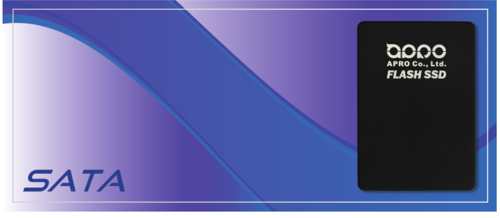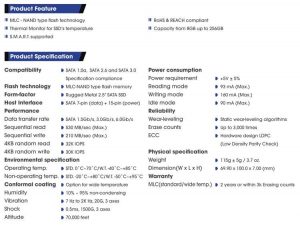Apro Muse-D MLC 2.5-Inch 6Gb SAT SSD With Marvell Controller and Toshiba Flash IC
8GB to 256GB, up to 530MB/s and 210MB/s sequential R/W, and up to 32,000/30,000 IO/s 4K random R/W speed
This is a Press Release edited by StorageNewsletter.com on August 22, 2018 at 2:14 pmAPRO Co. Ltd. announce the MUSE-D MLC 2.5″ SATA III SSD (7SF) to fulfill the demand of full-time high random R/W speeds for small files in industrial and embedded application.
It uses Marvell Technology Group Ltd. ‘s controller and Toshiba Memory Corporation‘s flash IC, providing the sequential R/W speeds up to 530MB/s and 210MB/s, and 4K random R/W speed up to 32,000/30,000 IO/s. With this high speeds, the SSD performs faster on high-density application no matter full-time data recorder or other special boot OS.
In order to solve the issue of NAND MLC storage lifespan, the firmware of MUSE-D 2.5″ SSD (7SF) is designed with the following technologies:
-
LDPC ECC: The LDPC ECC (low-density parity check) technology, compared to the existing ECC, has more error correction capability for longer code lengths, and can improve the scan cycle of flash memory. On the other hand, more errors can be corrected on each page to maintain a longer lifespan of the flash memory.
-
Power Loss Data Protection: In order to ensure that the last R/W command can be completed, the power loss data protection will stop reading or writing command when it senses the unstable power or insufficient wattage. Therefore, the data can be safely and completely saved in the SSD. Once the power is restored, the system will move on with the process.
-
Static Wear Leveling: static wear leveling is used to prevent the updating static data from staying in the static area and makes blocks fully and evenly applied, then each block can have the same usability. The static data includes OS files, lookup table, running files, etc. Hence, MUSE-D SSD (7SF) is a solution for system booting drive.
-
Garbage collection and TRIM: It has direct influence on performance and lifespan of SSD. The SSD must use garbage collection and TRIM to reduce the amount of garbage collected in order to decrease the time of wearing and maintain the lifespan.
-
SMART: The SSD supports SMART command set (Self-Monitoring, Analysis and Reporting Technology). The users will know the health condition of SSD from SMART. It can predict the lifespan of SSD but collect the data to know the degree of SSD usage, letting users change this product at the proper time without any doubt. Or, you can also provide the relevant data to firm’s engineer to do the technical analysis, and the company will offer the effective solution.
MUSE-D MLC 2.5″ SATA III SSD (7SF) is compliant with 2.5″ SATA SSD form factor with 7-pin data and 15-pin power interface and 7mm height to meet the industrial standard. The SSD also conforms to the SATA 3.1 (6Gb/s) specification with low power consumption and is the option for industrial application, compatible with 3Gb/s and 1.5Gb/s interface.
In addition, in order to ensure the quality, reliability and ability in different environment temperatures, the company chooses the specific components in order to conform to the standard of the industrial system. The MUSE-D MLC 2.5″ SATA III SSD (7SF) is designed to be used in the temperature 0°C ~ +70°C and also in wide temperature -40°C ~ +85°C. Moreover, the firm applies the conformal coating to the PCBA of SSD to consolidate the abilities of moisture prevention, dirt prevention, dust prevention and chemical pollution. The conformal coating can also avoid the corrosion from soldering and the contact between the conductor and the air, becoming an isolation and eliminating the electromagnetic interference.
The capacities are available from 8GB to 256GB.
Click to enlarge















 Subscribe to our free daily newsletter
Subscribe to our free daily newsletter

